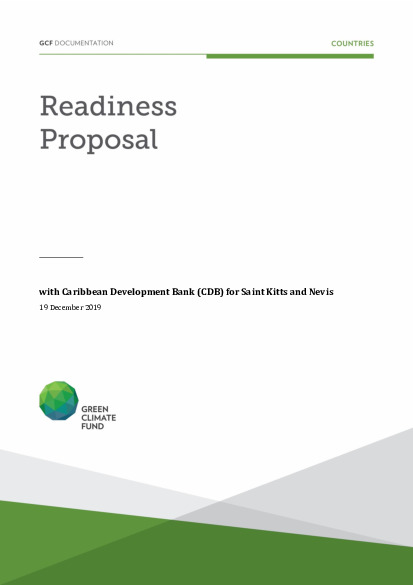GCF Readiness Proposal for St. Kitts and Nevis for Institutional Capacity and Coordination and Country Programming

GCF Readiness Proposal for St. Kitts and Nevis for Institutional Capacity and Coordination and Country Programming
In response to major changes to the European Union Sugar Protocol and the resultant closure of the sugar industry on St. Kitts, the Government of St. Kitts and Nevis (GSKN) launched the National Adaptation Strategy 2006-2013 (NAS) in 2006 to guide the socio-economic transformation of the economy. Since its implementation in 2006, a number of priority actions outlined as part of the NAS have been advanced. However, in 2008 due to the limited inflows of capital as a result of the effects of the global financial and economic downturn, the implementation and completion of activities were delayed. Therefore, the GSKN in July 2013 decided to extend the period of implementation for the NAS from 2006-2013 to 2006-2017.
St. Kitts and Nevis remains vulnerable to mounting developmental challenges due to geographic location; small land mass and population size; economic fragility; scarce resources and intensifying vulnerability to climate change related impacts. The Federation inventory of Green House Gases (GHGs) demonstrate a net sink of global carbon emissions though expected to be distressingly impacted. The Consultancy of Charles and Associates in 2015, assessed the climate finance readiness of the GSKN. Several weaknesses were highlighted, including limited climate change capacity at the sector and national level. The Government recognizes that the threat of Climate Change (CC) to national development must be addressed not merely at the operational level but throughout all of the Governments planning and monitoring systems in order to better inform the macro-economic processes.
The GSKN recognizes that a new National Development Plan must be developed to chart the way forward. It is envisioned by the GSKN that this new Plan will continue to build on the successes of the previous Plan and be inclusive of the Nationally Determined Contributions (NDCs), as well as incorporate the recently approved Climate Change Policy and accompanying Strategy, the Sustainable Development Goals (SDGs), Sendai Framework, the New Urban Agenda and the Samoa Pathway.
In an effort to bring a new climate resilient approach to the creation of sustainable cities and communities there is a need to revise the Urban Revitalization Plan (2004). The Plan will attempt to respond to the pressure points of shelter, employment creation, food supply, water, waste disposal, energy, transport, health and social services in the city of Basseterre. These pressure points can only be dealt with in the framework of integrated planning, well-organized implementation of such plans and high quality management of the city.